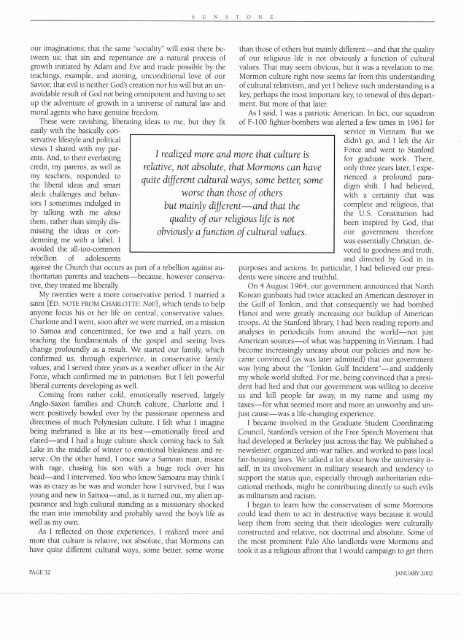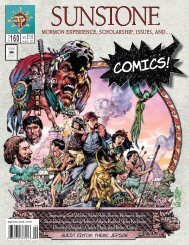Eugene England - Sunstone Magazine
Eugene England - Sunstone Magazine
Eugene England - Sunstone Magazine
Create successful ePaper yourself
Turn your PDF publications into a flip-book with our unique Google optimized e-Paper software.
our imaginations; that the same "sociality" will exist there between<br />
us; that sin and repentance are a natural process of<br />
growth initiated by Adam and Eve and made possible by the<br />
teachings, example, and atoning, unconditional love of our<br />
Savior; that evil is neither God's creation nor his will but an unavoidable<br />
result of God not being omnipotent and having to set<br />
up the adventure of growth in a universe of natural law and<br />
moral agents who have genuine freedom.<br />
These were ravishing, liberating ideas to me, but they fit<br />
easily with the basically conservative<br />
lifestyle and political<br />
views I shared with my parents.<br />
And, to their everlasting<br />
credit, my parents, as well as<br />
my teachers, responded to<br />
the liberal ideas and smart<br />
aleck challenges and behaviors<br />
I sometimes indulged in<br />
by talhng with me about<br />
them, rather than simply dismissing<br />
the ideas or condemning<br />
me with a label. I<br />
avoided the all-too-common<br />
rebellion of adolescents<br />
against the Church that occurs as part of a rebellion against au-<br />
thoritarian parents and teachers-because, however conservative,<br />
they treated me liberally<br />
My twenties were a more conservative period. I mamed a<br />
saint [ED. NOTE FROM CHARLOTTE: Not!], which tends to help<br />
anyone focus his or her life on central, conservative values.<br />
Charlotte and I went, soon after we were mamed, on a mission<br />
to Samoa and concentrated, for two and a half years, on<br />
teaching the fundamentals of the gospel and seeing lives<br />
change profoundly as a result. We started our family, which<br />
confirmed us, through experience, in conservative family<br />
values, and I served three years as a weather officer in the Air<br />
Force, which confirmed me in patriotism. But I felt powerful<br />
liberal currents developing as well.<br />
Coming from rather cold, emotionally reserved, largely<br />
Anglo-Saxon families and Church culture, Charlotte and I<br />
were positively bowled over by the passionate openness and<br />
directness of much Polynesian culture. I felt what I imagine<br />
being inebriated is like at its best-emotionally freed and<br />
elated-and I had a huge culture shock coming back to Salt<br />
Lake in the middle of winter to emotional bleakness and reserve.<br />
On the other hand, I once saw a Samoan man, insane<br />
with rage, chasing his son with a huge rock over his<br />
head-and I intervened. You who know Samoans may think I<br />
was as crazy as he was and wonder how I survived, but I was<br />
young and new in Samoa-and, as it turned out, my alien appearance<br />
and high cultural standing as a missionary shocked<br />
the man into immobility and probably saved the boy's life as<br />
well as my own.<br />
As I reflected on those experiences, I realized more and<br />
more that culture is relative, not absolute, that Mormons can<br />
have quite different cultural ways, some better, some worse<br />
I realized more and more that culture is<br />
relative, not absolute, that Mormons can have<br />
quite different cultural ways, some bettel; some<br />
worse than those of others<br />
but mainly different-and that the<br />
quality of our religous lfe is not<br />
obviously afunction of cultural values.<br />
than those of others but mainly different-and that the quality<br />
of our religious life is not obviously a function of cultural<br />
values. That may seem obvious, but it was a revelation to me.<br />
Mormon culture right now seems far from this understanding<br />
of cultural relativism, and yet I believe such understanding is a<br />
key, perhaps the most important key, to renewal of this department.<br />
But more of that later.<br />
As I said, I was a patriotic American. In fact, our squadron<br />
of F-100 fighter-bombers was alerted a few times in 1961 for<br />
service in Vietnam. But we<br />
didn't go, and I left the Air<br />
Force and went to Stanford<br />
for graduate work. There,<br />
only three years later, I experienced<br />
a profound paradigm<br />
shift. I had believed,<br />
with a certainty that was<br />
complete and religious, that<br />
the U.S. Constitution had<br />
been inspired by God, that<br />
our government therefore<br />
was essentially Christian, devoted<br />
to goodness and truth,<br />
and directed by God in its<br />
purposes and actions. In particular, I had believed our presidents<br />
were sincere and truthful.<br />
On 4 August 1964, our government announced that North<br />
Korean gunboats had twice attacked an American destroyer in<br />
the Gulf of Tonkin, and that consequently we had bombed<br />
Hanoi and were greatly increasing our buildup of American<br />
troops. At the Stanford library, I had been reading reports and<br />
analyses in periodicals from around the world-not just<br />
American sources-of what was happening in Vietnam. I had<br />
become increasingly uneasy about our policies and now became<br />
convinced (as was later admitted) that our government<br />
was lylng about the "Tonhn Gulf Incidentn-and suddenly<br />
my whole world shifted. For me, being convinced that a president<br />
had lied and that our government was willing to deceive<br />
us and kill people far away, in my name and using my<br />
taxes-for what seemed more and more an unworthy and unjust<br />
cause-was a life-changing experience.<br />
I became involved in the Graduate Student Coordinating<br />
Council, Stanford's version of the Free Speech Movement that<br />
had developed at Berkeley just across the Bay We published a<br />
newsletter, organized anti-war rallies, and worked to pass local<br />
fair-housing laws. We talked a lot about how the university itself,<br />
in its involvement in military research and tendency to<br />
support the status quo, especially through authoritarian educational<br />
methods, might be contributing directly to such evils<br />
as militarism and racism.<br />
I began to learn how the conservatism of some Mormons<br />
could lead them to act in destructive ways because it would<br />
keep them from seeing that their ideologies were culturally<br />
constructed and relative, not doctrinal and absolute. Some of<br />
the most prominent Palo Alto landlords were Mormons and<br />
took it as a religious affront that I would campaign to get them<br />
PAGE 32 JANUARY 2002

















